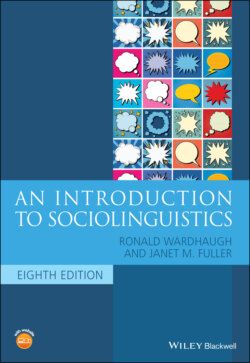Читать книгу An Introduction to Sociolinguistics - Ronald Wardhaugh, Janet M. Fuller - Страница 17
Competence and performance
ОглавлениеConfronted with the task of trying to describe the grammar of a language like English, many linguists follow the approach associated with Chomsky, who distinguishes between what he has called competence and performance. He claims that it is the linguist’s task to characterize what language users know about their language, that is, their competence, not what they do with their language, that is, their performance. The best‐known characterization of this distinction comes from Chomsky himself (1965, 3–4) in words which have been extensively quoted:
Linguistic theory is concerned primarily with an ideal speaker–listener, in a completely homogeneous speech‐community, who knows its language perfectly and is unaffected by such grammatically irrelevant conditions as memory limitations, distractions, shifts of attention and interest, and errors (random or characteristic) in applying his knowledge of the language in actual performance. This seems to me to have been the position of the founders of modern general linguistics, and no cogent reason for modifying it has been offered. To study actual linguistic performance, we must consider the interaction of a variety of factors, of which the underlying competence of the speaker–hearer is only one. In this respect, study of language is no different from empirical investigation of other complex phenomena.
However, it is exactly the interaction of social and linguistics factors that interests Labov, arguably the most influential figure in sociolinguistics in the last sixty or so years. He maintains (2006, 380) that ‘the linguistic behavior of individuals cannot be understood without knowledge of the communities that they belong to.’ This is the focus of sociolinguistics, and what makes it different from Chomskyan linguistics. We are primarily concerned with real language in use (what Chomsky calls performance), not the language of some ideal language user (i.e., an idealized competence). This distinction is reflected in methodological differences; syntacticians such as Chomsky will often use grammatical judgments to get at competence, while sociolinguists tend to use actual language production (see Part II for discussions of sociolinguistic methodologies).
Further, the knowledge which underlies language production, or performance, is more than just knowledge of grammar; language users must also know social norms for how to use a language – when it is appropriate to speak or to be silent, what topics are acceptable, what form of a question is appropriate to use with a friend versus your boss. There is thus another kind of competence, sometimes called communicative competence. This means knowing social rules for communication. These rules are often linked to language, but are also community‐specific. Communicative competence can be independent of grammatical competence; that is, someone may understand the form of the questions ‘What’s up?’ but not understand that this is a greeting, showing grammatical competence but a gap in communicative competence. The reverse may also be true; for instance a second language learner might use a polite form as dictated by the norms of a community, but not use prescriptively correct word order.
